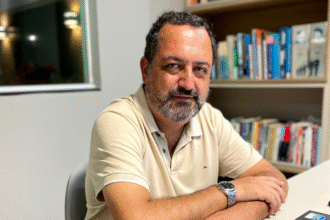Brazilian author Aliel Paione presents the third and final volume of his fictional trilogy entitled “Sol e Solitude in Copacabana”. With an analytical approach, the work dives into remarkable moments in the history of Brazil, intertwining them with the saga of love, ambition and loneliness experienced by the protagonist Verônica in the first half of the 20th century.
Amidst a turbulent political scenario, Paione leads the reader through Verônica’s search for love and personal fulfillment, as she becomes involved in a love triangle with her own daughter, Henriette, and the ambitious João Antunes. The author deftly connects the characters’ choices and dilemmas to the political events that shaped the country, from the attempt at economic independence to the industrialization and modernization of work.
Paione’s fluid narrative reveals the backstage of power and the political developments that culminated in the aggravating crisis after the return of Getúlio Vargas to power, leading readers to the president’s tragic suicide. In “Sol e Solidão em Copacabana”, the author presents a surprising ending to the plot, allowing the work to be read independently.
The complexity of the love relationships portrayed in the trilogy highlights the intricate human nature, metaphorically relating the dreams, achievements and failures of the characters to the history of Brazil. By seeking to understand them, readers reflect the desire to understand and improve the country’s reality.
Aliel Paione, in addition to being a writer, is an engineer and Master in Nuclear Sciences and Techniques. With his works now part of the collection of the United States Library of Congress, in Washington, Paione consolidates his place as a relevant author in the Brazilian literary scene.
“Sol e Solidão em Copacabana” promises to involve readers in an intense and captivating journey, merging the fictional plot with historical events in Brazil. The book is now available for appreciation by fans of the trilogy and lovers of Brazilian literature.
How did the idea of writing a trilogy that intertwines the political history of Brazil with the trajectory of the main characters come about?
I had read an article about the cabaret Mère Louise, which existed at the beginning of the 20th century in Copacabana. As I am very fond of History and Literature, in addition to being easy to write, I imagined a novel that would have its beginnings in the fairytale nights of the Mère Louise with the protagonism of the main characters, frequenters of that environment. Such characters would have their lives associated with the passing of History, and of the novel.
How did you approach the complexity of the characters’ love relationships and their connection to Brazilian history?
I tried to associate the dilemmas, frustrations, hopes and existential and love conflicts of the characters involved in the plot with the same aspirations, generally failed, of our story. That is, the approach consisted of associating our historical identity and its mismatches with the lives of the characters, as if their problems portrayed Brazilian problems.
What was the biggest challenge when writing the third volume, Sol e Solidão em Copacabana, and how did you deal with it?
The biggest challenge was connecting the whole plot with the final outcome, or conveying well the idea and objectives that I had set myself.

How do you see the relationship between literature and history, especially when it comes to portraying emblematic moments in Brazilian politics?
Because I see this relationship with a lot of potential to be explored, since it is possible, very easily, to associate relevant, unexpected and even tragic moments in Brazilian history with possible similar situations experienced by the characters. For example, the surprising resignation of Jânio Quadros, a caricatured figure, connected to the unusual betrayal of a wife…
What were your main sources of research to face the narrative of the first half of the 20th century?
I have a good library of books relating to 20th century history. I drew on her and my literary knowledge. Perhaps the best way to get to know history is through novels relating to the desired era (of course, narrated by a good novelist). As an example, the novels by Machado de Assis provide the best description of the social and political environment at the end of the empire and beginning of the republic, which took place in Rio.
Do you believe that the conclusion of the trilogy offers a message or reflection on the current reality in Brazil? If so, could you share a little bit about that?
Yes, I believe so, because knowing its past leads to the obstacles of present-day Brazil. And, in this trilogy, I address this aspect: how past events influenced the present. For example, how Old Republic politics led to later events. A representative character of this statement is Senator Mendonça, whose life and nefarious influence (with whom it all began) are narrated.
What are the main themes or issues you want readers to notice as they read the complete trilogy.
The main theme that permeates my work is the modern formation of Brazil and how and why it is governed, until the present. That is, to be directed by an elite that is insensitive to social problems and the reasons why the country has always existed in terms of the demands of this elite. This is the overarching message that overlays the others. It is the conclusion I expect from an attentive reader.
How was the experience of having the works of the trilogy integrated into the collection of the Library of Congress of the United States, in Washington at the request of the American consulate.
I felt vain, happy and rewarded when I received the news. And surprised to see the sensitivity shown by the Americans…
What were your biggest literary inspirations when writing the trilogy? Are there specific authors or works that have influenced your literary style?
In the first place, the decisive influence of Dostoyevsky’s work, for its psychological insights and deep dives into the human soul. Love it. Eça de Queiróz and Proust also inspired me. Examples include Crime and Punishment, The Brothers Karamasov, by Dostoevsky, Cousin Basílio, by Eça, and In Search of Lost Time, by Proust.
Now that the trilogy has been completed, what are your literary projects? Do you intend to explore other historical periods or address other themes in your future reflections?
For now, I’m pregnant with ideas, maybe in the third month of pregnancy, and I still haven’t had the ultrasound…
Follow Aliel Paione on Instagram





